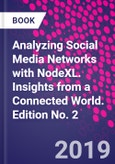Analyzing Social Media Networks with NodeXL: Insights from a Connected World, Second Edition, provides readers with a thorough, practical and updated guide to NodeXL, the open-source social network analysis (SNA) plug-in for use with Excel. The book analyzes social media, provides a NodeXL tutorial, and presents network analysis case studies, all of which are revised to reflect the latest developments. Sections cover history and concepts, mapping and modeling, the detailed operation of NodeXL, and case studies, including e-mail, Twitter, Facebook, Flickr and YouTube. In addition, there are descriptions of each system and types of analysis for identifying people, documents, groups and events.
This book is perfect for use as a course text in social network analysis or as a guide for practicing NodeXL users.
Table of Contents
Part I. Getting Started with Analyzing Social Media Networks 1. Introduction to Social Media and Social Networks 2. Social Media: New Technologies of Collaboration 3. Social Network Analysis: Measuring, Mapping, and Modeling Collections of Connections
Part II. NodeXL Tutorial: Learning by Doing 4. Installation, Orientation, and Layout 5. Labeling and Visual Attributes 6. Calculating and Visualizing Network Metrics 7. Grouping and Filtering 8. Semantic Networks
Part III. Social Media Network Analysis Case Studies 9. Email: The Lifeblood of Modern Communication 10. Thread Networks: Mapping Message Boards and Email Lists 11. Twitter: Information Flows, Influencers, and Organic Communities 12. Facebook: Public Pages and Inter-Organizational Networks 13. YouTube: Exploring Video Networks 14. Wiki Networks: Connections of Culture and Collaboration
Authors
Derek Hansen Department of Information Technology, Brigham Young University, Provo, Utah. Derek L. Hansen is an associate professor in the Information Technology program at Brigham Young University. Prior to that he was at the University of Maryland's iSchool where he directed the Center for the Advanced Study of Communities and Information and was a member of the Human Computer Interaction Lab. Dr. Hansen completed his PhD from the University of Michigan's School of Information where he was an NSF-funded interdisciplinary STIET Fellow focused on understanding and designing effective online socio-technical systems. Dr. Hansen's research and teaching focuses on understanding and designing social technologies, tools, and games for the public good. He has received over $2 million in grants (as a PI or co-PI) to help develop and test novel technical interventions with interdisciplinary collaborators including educational Alternate Reality Games (AGOG, DUST, The Tessera), Playable Case Studies (Microcore), Citizen Science games (Floracaching, Odd Leaf Out), and exercise games (Fitplay Games, various pervasive play games). He has also worked with the Social Media Research Foundation and Human Computer Interaction Lab (HCIL) to develop and evaluate NodeXL, a free network analysis and visualization tool that runs in Microsoft Excel and is designed to help community analysts make sense of the mass of data available via social media tools such as Twitter, Facebook, and email. Ben Shneiderman Department of Computer Science and Founding Director of the HCI Lab, University of Maryland. Ben Shneiderman is a professor in the Department of Computer Science and founding director of the Human-Computer Interaction Laboratory at the University of Maryland. He was elected as a Fellow of the Association for Computing (ACM) in 1997, a Fellow of the American Association for the Advancement of Science (AAAS) in 2001, and a Fellow of the National Academy of Inventors (NAI) in 2015. He is a past recipient of the ACM SIGCHI Lifetime Achievement Award. Dr. Shneiderman is the author and coauthor of many books, technical papers, and textbooks. Marc A. Smith Chief Social Scientist, Connected Action Consulting Group;. Marc Smith is a sociologist specializing in the social organization of online communities and computer mediated interaction. He founded and managed the Community Technologies Group at Microsoft Research in Redmond, Washington and led the development of social media reporting and analysis tools for Telligent Systems. Smith leads the Connected Action consulting group and lives and works in Silicon Valley, California. He is a co-founder of the Social Media Research Foundation which is dedicated to Open Tools, Open Data, and Open Scholarship related to social media.Smith's research focuses on computer-mediated collective action: the ways group dynamics change when they take place in and through social cyberspaces. Smith's goal is to visualize these social cyberspaces, mapping and measuring their structure, dynamics and life cycles. At Microsoft, he developed the "Netscan� web application and data mining engine that allows researchers studying Usenet newsgroups and related repositories of threaded conversations to get reports on the rates of posting, posters, crossposting, thread length and frequency distributions of activity. Smith applied this work to the development of a generalized community analysis platform for Telligent, providing a web based system for groups of all sizes to discuss and publish their material to the web and analyze the emergent trends that result. Dr. Smith is an adjunct faculty at the College of Information Studies at the University of Maryland and a Distinguished Visiting Scholar at the Media-X Program at Stanford University. Itai Himelboim Grady College of Journalism & Mass Communication, University of Georgia, Athens, Georgia USA. Dr. Itai Himelboim is director of the SEE Suite, Social media Engagement & Evaluation and Associate Professor, Advertising, at the University of Georgia, He studies the role social media plays in news, politics and international communication. Through applying network analysis, he examines political talk and information flow. His research involves computer-mediated social networks and their implications for political communication, international communication and the news.








